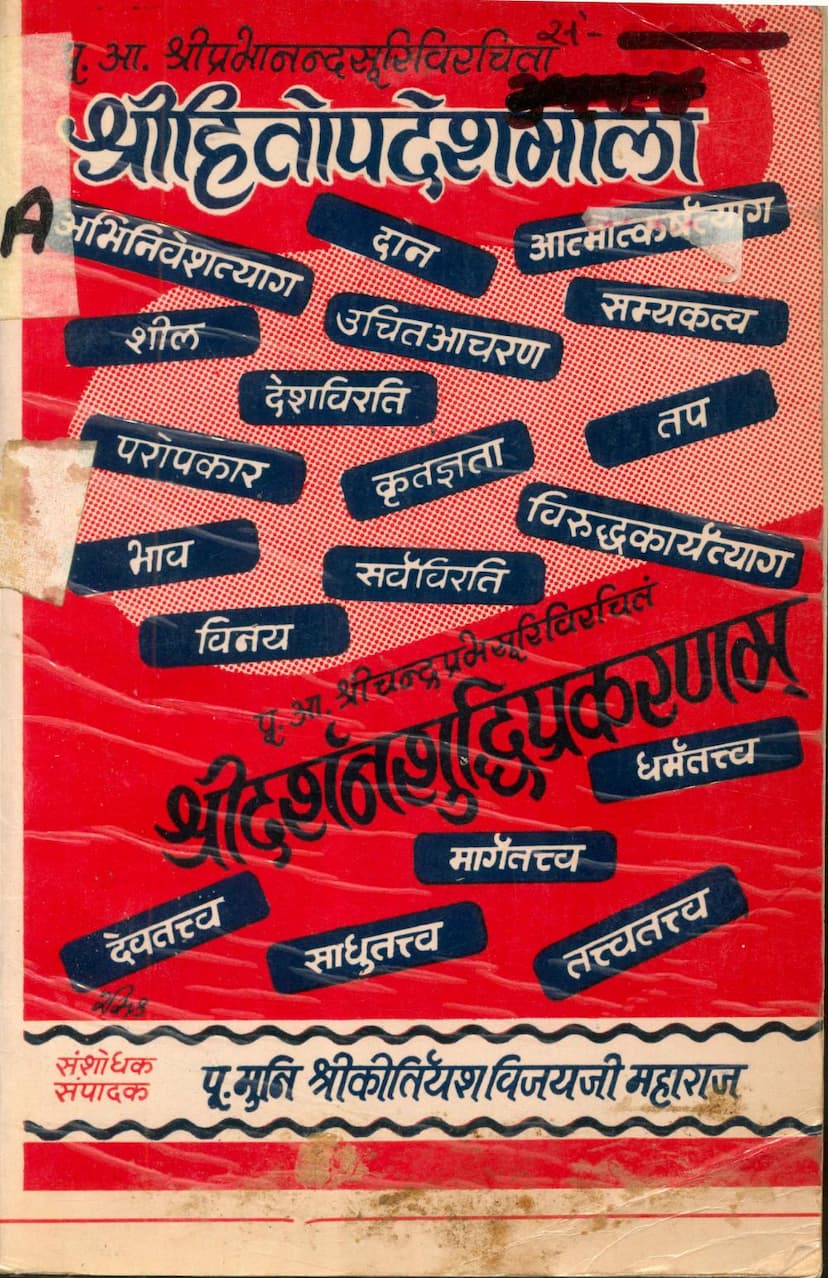Hitopdeshmala Evam Darshanshuddhi Prakaranam
Added to library: September 1, 2025

Summary
This Jain text, titled "Hitopadeshmala evam Darshanshuddhi Prakaranam", is a compilation of two significant works by eminent Jain acharyas: "Hitopadeshmala" by Acharya Prabhanandsuri and "Darshanshuddhi Prakaranam" by Acharya Chandraprabhsuri, with editing and compilation by Muni Shri Kirtiyashvijayji. Published by Naginbhai Paushadhshala in Patan, the book aims to disseminate profound Jain philosophical and ethical teachings to a wider audience.
The "Hitopadeshmala", authored by Acharya Prabhanandsuri, is a comprehensive treatise of 525 verses. It meticulously outlines the path to ultimate liberation (moksha) through a detailed exposition of key Jain principles and virtues. The book emphasizes the following essential qualities and practices:
- Right Faith (Samayakva): The text elaborates on the nature of right faith, its importance, the five defects of right faith (doshas), its five characteristics (lakshanas), and its five adornments (bhushanas).
- Accumulation of Excellent Qualities (Uttam Guna Sangraha): It details eleven essential qualities, including:
- Generosity (Dana): Discussed in four types: Abhayadan (fearlessness), Anukampadan (compassion), Jnanadan (knowledge), and Bhaktidan (devotion).
- Virtue/Conduct (Shila): Emphasizes the difficulty but ultimate importance of observing virtuous conduct.
- Austerity (Tapa): Explains twelve types of austerity (six external and six internal) and its role in shedding karma.
- Attitude/Inner State (Bhava): Highlights that without the right inner attitude, acts of generosity, virtue, and austerity become mere burdensome rituals.
- Humility/Reverence (Vinaya): Differentiates between worldly and spiritual humility and stresses the importance of overcoming pride (mana).
- Beneficence/Helping Others (Paropakara): Discusses both material and spiritual help rendered to others, citing examples from nature and the lives of great souls.
- Proper Conduct (Uchita Acharana): Outlines appropriate behavior towards parents, siblings, spouse, children, relatives, spiritual guides, fellow citizens, and guests.
- Renunciation of Country/State/Public/Religious Opposition (Desha-rajya-loka-dharma Viruddha Tyaga): Details the importance of avoiding actions contrary to one's country, state, public norms, and religious principles.
- Self-Exaltation/Pride Renunciation (Atmotskarsha Tyaga): Warns against the pitfalls of ego and self-praise, highlighting their detrimental effects on spiritual progress.
- Gratitude (Krutagnata): Defines gratitude as the essence of virtue, contrasting it with ingratitude.
- Renunciation of Attachment/Dogmatism (Abhinivesha Tyaga): Explains how dogmatism and false attachments hinder spiritual growth and obscure the truth.
- Renunciation (Virati): Discusses the two stages of renunciation: partial (Deshavirati) with twelve vows and their transgressions, and complete (Sarvavruti) with five great vows, five restraints (samitis), and three disciplines (guptis). The text also emphasizes overcoming attachment (pramada) and passions (kashayas).
The "Darshanshuddhi Prakaranam", authored by Acharya Chandraprabhsuri, focuses on purifying one's understanding of Jain tenets. It is presented as a collection of verses from earlier acharyas, aiming to clarify the nature of right faith. The key aspects covered are:
- The Five Tattvas: The text elaborates on the core principles of Jainism: God (Deva), Religion/Duty (Dharma), Path (Marga), Spiritual Guide (Sadhu), and the fundamental substances of existence (Jivadina Tattvas). It highlights the importance of correct understanding and faith in these five elements, contrasting it with wrong faith (mithyatva).
- The Nature of God (Deva Tattva): It describes the qualities of the Arihant, emphasizing their perfection, freedom from eighteen blemishes, and distinguishing them from other deities.
- The Significance of Religion (Dharma Tattva): It defines religion in a broad sense and mentions the twelve vows of a householder and the ten aspects of an ascetic's duty, stressing the need for twenty-one specific virtues to qualify for true religion.
- The Path (Marga Tattva): Critiques deviations from the true path (unmarga pravrutti), such as performing temple construction without proper understanding or engaging in worldly practices disguised as religious acts. It clarifies the distinction between material worship (dravya-stavan) and inner devotion (bhava-stavan), asserting that the latter is for monks.
- The Spiritual Guide (Sadhu Tattva): Discusses the eighteen blemishes from which monks should be free and the necessary conduct for their sustenance (ahara). It also outlines the thirty-six virtues of an acharya and the importance of proper conduct and respect towards spiritual teachers.
- The Principles of Existence (Tattva Tattva): Explains the nine tattvas (Jiva, Ajiva, Punya, Papa, Asrava, Samvara, Nirjara, Bandha, Moksha), focusing on the nature of the soul, its karmic bondage, and the path to liberation. It details the various classifications of souls, senses, life-span, and the soul's journey through different states of existence.
The book is a valuable resource for those seeking to deepen their understanding of Jain philosophy, ethics, and spiritual practices. It offers practical guidance on cultivating virtues and adhering to the correct path towards spiritual liberation, presented through the profound wisdom of these revered acharyas.